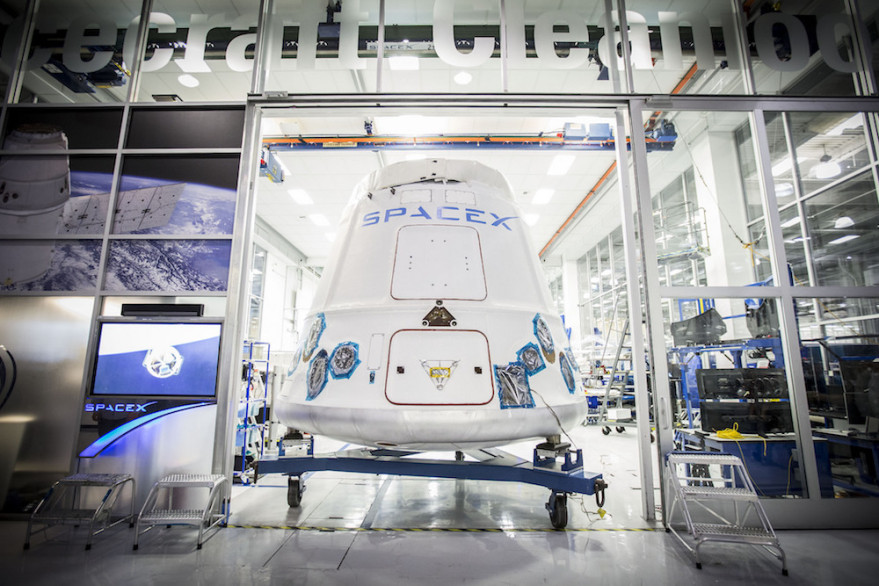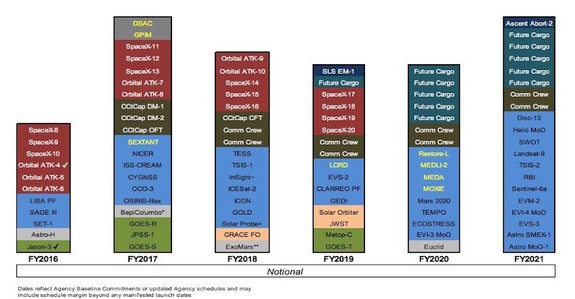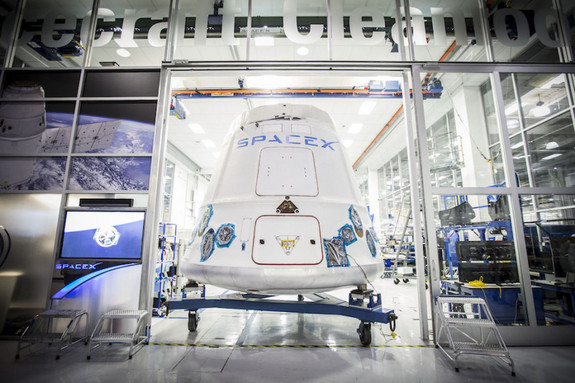
A Dragon capsule leaving SpaceX’s Hawthorne, California, headquarters in 2015.
Credit: SpaceX
NASA has awarded five additional space station cargo-supply missions to SpaceX in a late-December contract with an undisclosed value that industry officials estimate at around $700 million.
The contract, signed just before Christmas , was not announced at the time by either party but has been confirmed by both. It brings to 20 the number of missions now assigned to SpaceX under the Commercial Resupply Services (CRS) contract first signed in 2008.
In contrast, the other company performing CRS missions, Orbital ATK of Dulles, Virginia, has been assigned just 10 flights and was not part of the end-year orders. [Photos: The Rockets and SpaceShips of SpaceX ]
NASA spokeswoman Cheryl M. Warner did not directly address whether the new contracts were competed.
“We order resupply flights from our commercial providers via the contract modification process based on the mission needs to resupply the international space station,” Warner said Feb. 23.

NASA’s December award of five new ISS cargo supply missions to SpaceX carries an estimated value of around $700 million. Orbital ATK received no awards in what is likely the final mission selection before NASA moves to its CRS-2 contract.
Credit: NASA
Hawthorne, California-based SpaceX and Orbital ATK signed separate CRS contracts in 2008. The contract has proved resistant to outside analysis because both NASA and its suppliers have invoked commercial sensitivity in declining to disclose details.
It has become only more complicated with the passage of time.
Originally designed as a service arrangement wherein NASA pays for an agreed-to amount of cargo delivered to the station, the CRS terms and conditions have evolved to account for the number of launchers involved, and not just the kilograms delivered, NASA spokeswoman Stephanie L. Schierholz said Feb. 23.
For example, the Orbital contract included an 11th launch, which was subsequently spread out over other missions, she said.
SpaceX’s original CRS contract was valued at $1.6 billion and was to cover the delivery of 20,000 kilograms of supplies to the space station. The original estimate was that this would cover 12 launches of the SpaceX Falcon 9 rocket and its Dragon cargo capsule, which is capable of returning experiment hardware to Earth once its mission to the space station is completed.

A Dragon capsule leaving SpaceX’s Hawthorne, California, headquarters in 2015.
Credit: SpaceX
Orbital’s contract was valued at $1.9 billion and was intended to cover eight launches of Orbital’s Antares rocket, which unlike Falcon 9 had not yet flown when the CRS work was booked. The Orbital Cygnus canister is burned up in the atmosphere after each mission and is not able to return payload to Earth.
Both companies booked further CRS orders – the 9th and 10th mission for Orbital, and the 13th, 14th and 15th for SpaceX – in early 2015 as part of CRS contract extensions. SpaceX President Gwynne Shotwell said at the time that the SpaceX work was valued at about $150 million per mission for the three new orders. SpaceX’s original CRS contract averaged $133.3 million per lauch mission.
Schierholz said CRS is being managed as an indefinite-delivery, indefinite-quantity contract with Orbital and SpaceX under which the companies are promised a maximum of $3.1 billion each. But there is no guarantee that this figure will be reached.
Under such an arrangement, NASA is free to pursue work orders with one or the other contractor without running competitive bids for each mission.
NASA in January contracted with three companies – Orbital and SpaceX, plus Sierra Nevada Corp. of Sparks, Nevada – for a CRS-2 contract covering cargo missions between 2019 and 2024.
Each company has been promised a minimum of six missions under the contract, which will cost NASA up to $14 billion between 2016 and 2024. The exact budget will depend on the mix of vehicles needed to meet the station’s requirements at the time.
NASA said in its statement on CRS-2 that SpaceX and Orbital combined had delivered around 16,000 kilograms of cargo to the orbital complex.
It is unclear whether the December award to SpaceX indicates that Orbital’s Cygnus is falling out of favor with the agency as it assesses space station requirements in the coming years.
“NASA assigns the CRS missions using ISS requirements as the primary determinant for the award,” Orbital spokeswoman Vicki Cox said Feb. 24. “We are ready to support additional cargo resupply flights based on NASA’s requirements and specific needs for future missions.”
This story was provided by SpaceNews , dedicated to covering all aspects of the space industry.


Comments are closed.